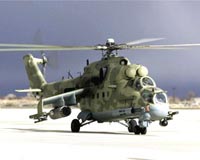
Helos For Jakarta Sets Future Tone For Arms Deals
July 04, 2008 The delivery of six Russian Hind Mi-35 helicopters to Indonesia this month is neither a large arms deal nor an unprecedented one -- but it is still a highly significant event.
For the deal is just a small part of a huge $1 billion plus arms deal that then-Russian President and current Prime Minister Vladimir Putin nailed down last year.
Within that overall package, Russia is also buying three Sukhoi Su-27SKM and three Sukhoi Su-30MK2 aircraft. This too is not entirely unprecedented. The Indonesian armed forces are already operating two Sukhoi Su-27 SKs and two Sukhoi Su-30 MKs.
The key reason for the deal is that Russia is virtually giving the arms away free. Indonesia does not even have to start paying for them for another 15 years, and it has been given exceptionally easy credit terms. With its soaring revenues from oil and gas exports, the Kremlin can certainly afford to be generous when it is buying major strategic influence and supplanting the United States in an arms market that has been an almost exclusively American preserve for more than four decades.
However, the nature of Indonesia's unique security problems makes the nature of the Russian weapons offered to it exceptionally attractive.
Indonesia is an enormous archipelago of 17,500 islands, of which 6,000 are inhabited. It therefore faces enormous challenges of cost effectively maintaining security over a sprawling area.
Air and sea superiority over hostile navies and air forces is not the primary Indonesian concern. With its huge size and population of more than 212 million, even major nations like Japan and China treat it with respect. Therefore, Indonesia has no need for large fleets of expensive state-of-the-art combat aircraft with sophisticated electronics or costly high-tech surface warships.
This means that buying relatively low tech but very cheap Sukhoi aircraft and Hind helicopters makes sense for Jakarta. It will not be as difficult to train up its armed forces engineers and mechanics to maintain these simpler aircraft and warships.
Buying a Kilo-class submarine for Russia also makes sense to defense planners in Jakarta. The United States does not even make any diesel subs anyway. Germany, Sweden and France all do. And they are very good ones. But those major European nations have a tradition of getting angry about major human-rights violations, and with the security problems Indonesia faces, the armed forces and successive Indonesian governments have little taste for making the security of their strategic arms supplies dependent on the goodwill or moral disapproval of European democracies if they can avoid it.
Therefore, buying four Project 636 class Kilo diesel-electric subs and two Lada-class ones from Russia was obviously an attractive option even if the terms of the deal weren't so remarkably good.
Even as it is, the Kilos are formidable weapons systems, while being small and cheap to operate. They could carry anti-ship cruise missiles -- and Russia makes the world's best sea-to-land missiles with a range of more than 150 miles.
Even these modest weapons systems, therefore, will give Indonesia an air and sea capability that only nations as far away as Japan, China, Australia and India could match or exceed.
But if the deal is an ideal one for Indonesia, it offers far greater opportunities for Russia.
The prospect of displacing U.S. influence after 40 years in the largest Muslim nation in the world, and one astride the sea transport routes from the Middle East oil producers to the great industrial nations of Northeast Asia, is obviously a huge prize for the Kremlin.
But in addition, the success of the arms deal with Indonesia offers Moscow a model for buying friends and extending its global influence throughout the developing world.
For most developing nations cannot afford the superb but highly expensive and high-tech aircraft and warships that the main U.S. defense contractors now produce.
Nations such as Taiwan, South Korea, Japan, Israel, Australia and the major European states will still have to come to America for many, if not most of their strategic arms systems, especially in the fields of aircraft and ballistic missile defense. But the Russian model of offering cheap, far easier to maintain and much smaller aircraft and ships, especially diesel subs, with no strings attached for human-rights violations or international bad behavior, is bound to prove attractive to a lot of countries around the world including some, like Indonesia, that have long been U.S. allies.
No comments:
Post a Comment